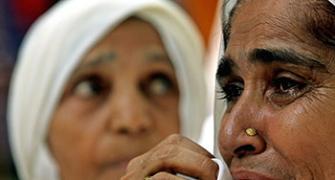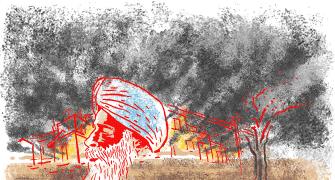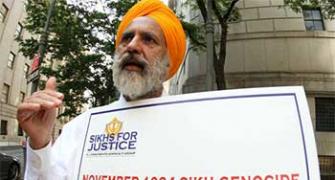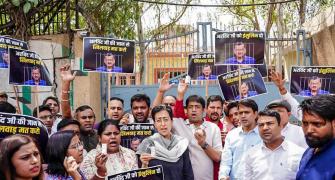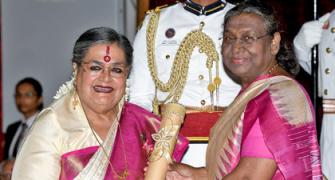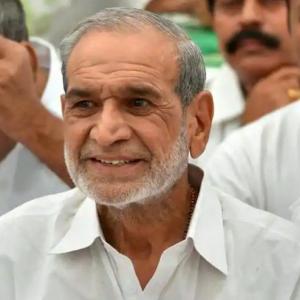Former Congress leader Sajjan Kumar on Monday surrendered before a New Delhi court on the last day of the deadline set by Delhi high court and was sent to jail to serve his life sentence in a case relating to the deadly anti-Sikh riots in 1984.

Kumar, 73, was brought to Mandoli jail in northeast Delhi shortly after he surrendered before Metropolitan Magistrate Aditi Garg, who directed that he be provided a separate van for commuting due to 'security threat'.
Clad in a black coat and trousers, a cream coloured muffler and a blue cap, Kumar, a former Lok Sabha MP, was flanked by his lawyers and surrounded by scores of security personnel as he arrived at Karkardooma court at 2.15 pm.
Calling it a 'big relief' for the riots victims who have been fighting for justice for the past 34 years, Shiromani Akali Dal member Manjinder Singh Sirsa said millions of people who have harboured the pain of 1984 in their hearts want to see 'big fish' Sajjan Kumar surrender.
This will be the beginning of justice and punishment for the main Congress leaders involved, he said.
"We will not rest till everyone guilty in the anti-Sikh 1984 riots are brought to justice," he added.
Kumar is the first big politician to be convicted in the riots. In its judgment on December 17, the high court noted that over 2,700 Sikhs were killed in the national capital, holding that the riots was indeed a 'carnage of unbelievable proportions'.
The riots broke out after the assassination of then prime minister Indira Gandhi on October 31, 1984, by her two Sikh bodyguards.
Outside the court complex, a group of Sikhs gathered raising slogans and showing the victory sign after Kumar surrendered. Media persons were not allowed inside the court room by the judge and security officials.
The trial court declined the plea of Kumar's lawyer that he be sent to high-security Tihar Jail as the case pertains to Delhi Cantonment area which comes under this jail's jurisdiction.
It was informed by jail authorities that from Karkardooma court, all convicts are first taken to Mandoli jail and from there, the authorities may shift them to another jail, if they deem it appropriate.
"The convict is taken into custody and be sent to jail as per rules. Since, there is security threat to the convict, he be provided a separate van for commuting from court to jail and from jail to court," the magistrate said in the two-page order.
Kumar came to the courtroom surrounded by 2-3 commandos along with 20-25 Delhi Police personnel, including women, said one of the police officers.
He was flanked by his confidant Kailash and 4-5 advocates. No family member or Congress leader accompanied him.
The high court convicted and sentenced Kumar to life imprisonment for the 'remainder of his natural life' and set a December 31 deadline for him to surrender.
On December 21, it refused to extend the deadline by one month as pleaded by him. After his conviction, Kumar resigned from the Congress party.
The case in which Kumar was convicted and sentenced relates to the killing of five Sikhs in Delhi Cantonment's Raj Nagar Part-I area of southwest Delhi on November 1-2, 1984 and burning down of a Gurudwara in Raj Nagar Part-II.
Kumar has filed an appeal in the Supreme Court challenging the conviction and life sentence awarded to him. There is also another anti-Sikh riots case pending against him.
As a precautionary measure, sikh prisoners in Mandoli Jail complex will be kept away from Kumar's ward, jail sources said.
The sources said he will be lodged in ward 14. He was brought by the police after a medical examination at a Delhi government hospital.
Shiromani Akali Dal Badal chief Sukhbir Singh Badal said Congress president Rahul Gandhi had a lot of questions to answer as to why his family protected Sajjan Kumar, Kamal Nath and Jagdish Tytler.
"Even now Tytler not expelled. Kamal Nath made CM of MP. Clear culprits know Gandhi family role in genocide against Sikhs and that is why Rahul is protecting them," he said.
Magistrate Garg was informed by Kumar's counsel that the Rs 1 lakh fine imposed by the high court is yet to be deposited.
Earlier in the day, former MLAs Krishan Khokhar and Mahender Yadav, who were also convicted in the same case, surrendered before the court to serve their 10-year jail term. They were accompanied by family members and relatives.
The court allowed Yadav to take spectacles and a walking stick to jail.
They both were sentenced to three years jail by the trial court for the offence of rioting and armed with deadly weapons, but the high court enhanced their jail term by convicting them for criminal conspiracy, mischief by fire or explosive substance with intent to destroy house, promoting enmity between different groups on ground of religion and injuring a place of worship to insult the religion.
Besides Kumar, Yadav and Krishan, the others convicted in the case were former Congress councillor Balwan Khokhar, retired naval officer Captain Bhagmal and Girdhari Lal.
Setting aside the trial court's 2010 verdict which had acquitted Kumar in the case, the high court also held that the riots were a 'crime against humanity' perpetrated by those who enjoyed 'political patronage' and aided by an 'indifferent' law enforcement agency.
It further said there has been a familiar pattern of mass killings since Partition, like in Mumbai in 1993, Gujarat in 2002 and Muzaffarnagar, Uttar Pradesh in 2013, and the 'common' feature of each was the 'targeting of minorities' with the attacks being 'spearheaded by the dominant political actors, facilitated by law enforcement agencies'.
From a municipal councillor to a three-time Lok Sabha member, veteran politician Sajjan Kumar has scaled the heights of Delhi politics, but it was his alleged involvement in a 1984 anti-Sikh riots case that gradually brought down his career and his eventual conviction.
Sources close to him, said, the politician, grew up in Jatwada area in Old Delhi and later moved to Prasad Nagar area of Karol Bagh, slowly but steadily climbing the ladder of politics.
"In late 70s, he fought the MCD (Municipal Corporation of Delhi) elections, in which Congress had bagged just 14 seats, but he won by amassing huge votes from Nangloi. In 1977, he was also the general secretary of the Pradesh Congress Committee," a senior Congress leader said, on the condition of anonymity.
The senior leader claimed that Kumar had proximity to former prime minister Indira Gandhi and her younger son Sanjay Gandhi.
A Jat leader, Kumar's rise in politics got a 'big push' with his victory in the 1980 general elections from Outer Delhi seat, in which he defeated Chaudhary Brahm Prakash, who had served as the first chief minister of Delhi.
"Sajjan Kumar won his first Lok Sabha seat as a young MP and he had defeated Chaudhary Brahm Prakash with a huge vote margin. He ruled Outer Delhi, and this was his ascent in politics," the senior leader said.
According to Lok Sabha website, Kumar was involved in 'extending financial help for marriage ceremonies of daughters of widows and poor women; rehabilitation of residents of JJ colonies; helping the handicapped and the disabled; active participation in movement relating to abolition of untouchability'.
But, the aftermath of the 1984 riots put a brake on his career, after which Kumar 'withdrew from public glare' and started contributing to the party from behind the scene, he said.
The anti-Sikh riots had broken out after the assassination of then prime minister Indira Gandhi on October 31, 1984, by her two Sikh bodyguards.
After 34 years since the riots broke out, the high court on December 17 had convicted and sentenced Kumar to life imprisonment for the 'remainder of his natural life'.
The case in which Kumar was convicted and sentenced relates to the killing of five Sikhs in Raj Nagar Part-I area in Palam Colony of southwest Delhi on November 1-2, 1984 and burning down of a Gurudwara in Raj Nagar Part-II.
The senior Congress leader said, after a hiatus, Kumar was back in active politics, as he was re-elected to the Lok Sabha, for his second term in 1991, and again in 2004.
Kumar's conviction in connection with a 1984 anti-Sikh riots case, signalled the end of his career, culminating with his incarceration after he surrendered on Monday.

